Faith vs. Finance:
What effect does affluence have on spirituality?
By Julian Archer
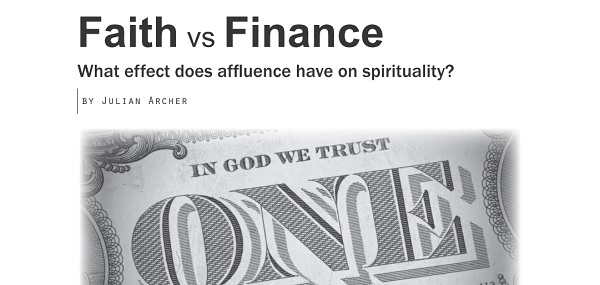
See-saws or teeter-totters are common in playgrounds around the world. The name see-saw is a direct Anglicisation of the French ci-ça, meaning literally, this-that. The see-saw is an ‘either/or,’ a ‘this or that’ mechanical device. You can only have one side at the top at any given time, never both.
Is that how it is with faith and finance? Can we only ever have faith or finance, never both? Or is it only great faith and great finance that tend to see-saw? Do we even have a see-saw dilemma here at all?
What I’ve Learned in the Playground ‘Down Under’
According to the latest reports, my country, Australia, is one of the most affluent nations on the earth. The 2013 Credit Suisse Global Wealth Report1 shows that Australian adults have the second highest wealth level of any country on the planet (second only to Switzerland), and that our median wealth level per adult is the highest, at more than double Switzerland’s! Even though we may not always feel like it, as a country we are extremely wealthy, and our wealth is also more evenly distributed than many other nations.
I have spent many years as a Christian trying to maintain a strong relationship with God while my income was high enough for me to be very self-sufficient. I find that I must ask the questions, “What impact has our affluence in Australia had on our spirituality? Has it led us nearer to God, to a greater faith? Or has it turned our eyes from Him? Or are our finances completely unrelated to our faith?”
To find answers we could look at changes over time in things like church attendance and the percentage of income given to religious causes, but we know that people can attend church and make significant donations to religious causes without having a saving, daily relationship with Jesus Christ. I know it, because I’ve been there myself.
So, while it’s still not a watertight measure, let’s look instead at the perceived importance of religion in our daily lives.
In 2009, the Gallup Poll2 reported on their surveys conducted in 114 countries. One of the questions they asked was, “Is religion an important part of your daily life?” Gallup also researched the per-capita income levels for each country and then made correlations between the two (see Table 1). 3
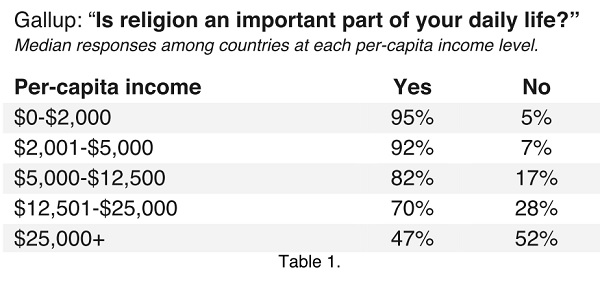
It is clear from the data that the see-saw effect is in full swing. The lower the per-capita income of a nation, the higher the role of religion in daily life. And vice versa, the higher the per-capita income of a nation, the lower the role of religion in daily life.
Let’s zoom in on some of the nations at the top and bottom of the ‘Faith vs Finance’ see-saw. Table 2 is based on data from both the Gallup Poll and the Credit Suisse Global Wealth Report.
The data clearly shows a great divide, in both the importance of religion and levels of wealth, between the world’s richest and poorest nations.
It could be argued that the reason for the high wealth ranking of these ‘Top 10’ wealthiest nations in Table 2 is because they originally based their societies and business practices on Christian principles and God blessed them. However, times are changing. The see-saw has tilted and affluence is toppling both religion and spirituality.
Much of the Christian world is seeing the clear fulfillment of a 1789 statement by John Wesley, the founder of the Methodist Church. “Wherever true Christianity spreads, it must cause diligence and frugality, which, in the natural course of things, must beget riches. And riches naturally beget pride, love of the world, and every temper that is destructive of Christianity!”
Mahatma Gandhi once said, “The fact is, the moment that financial stability is assured, spiritual bankruptcy is also assured.”
Gandhi seemed to be reflecting Jesus’ words, “It’s easier for a camel to pass through the eye of a needle than for a rich man to enter heaven” (Mark 10:25).
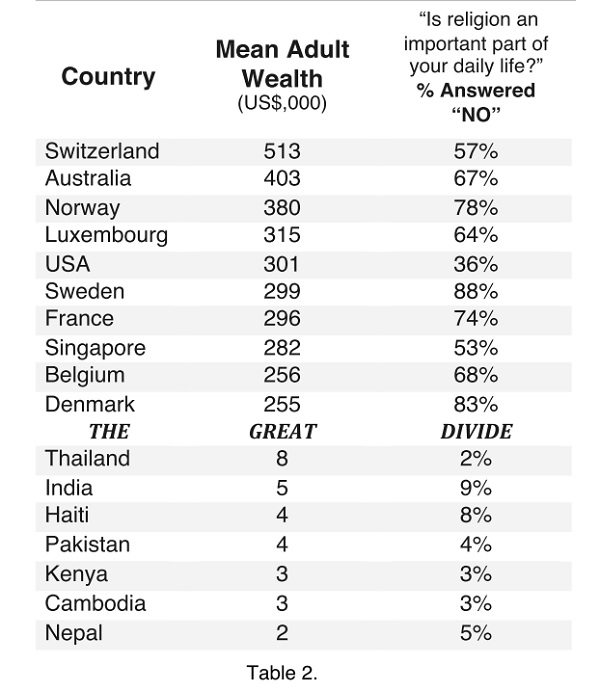
I know from my personal experience that when people are financially blessed, they’re in the most spiritually dangerous stage of their life. The higher my income went the less I felt my need for God on a day-to-day basis. My income taxed my spirituality.
As I run Faith vs Finance seminars I see that most affluent Christians, in their deepest hearts, really do want a vibrant, life-changing relationship with God. They’re frustrated, however. They’re frustrated because they feel like they’re being forced to live a life focused on earthly priorities when they know that true satisfaction and fulfillment only come from eternal things. I can hear their cries because I spent years ‘living the dream’ but aching for a deeper relationship with God.
I came to a realization that God’s material blessings had become a curse in my spiritual life. That’s not a popular message, but I’m being totally honest. It’s not that God’s blessings are always curses, but that we often use them in such a way that they become curses. When we allow God’s material blessings—our income, holidays, homes, investments, and talents—to fill up our hearts, we can’t open our heart’s door to Jesus, and that’s a curse—an eternal curse.
The Bible is full of examples where the mistreatment of God’s blessings led to curses. One of the simplest is in Deuteronomy 6 where Moses is talking to the children of Israel just before they cross into the Promised Land.
Moses tells them that they’re about to enter a “land flowing with milk and honey.” In other words, it’s a ‘lucky country’ like the ‘Top 10’ nations. Moses adds the clincher, however, when he says, “When you have eaten and are full—then beware, lest you forget the Lord your God.” It’s a powerful reminder that a full stomach can make us pretty sleepy.
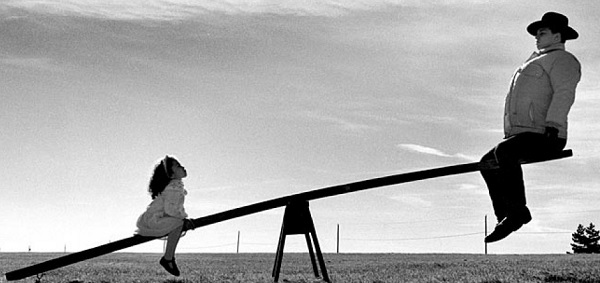
See-saw Snapshot
So what does this see-saw look like in the day-to-day life of a comfortable Christian? Let’s look at three areas:
1. FOCUS: When I “build bigger barns” and store up my treasures here on earth, accumulating God’s material blessings like real estate, investments and finances, they easily distract me from eternal riches. I start to worry about them, and I invest increasing amounts of time and energy into protecting and multiplying the blessings, instead of trusting completely in Him. My finances rise, but my faith falls—and I often don’t even realize it (see Rev. 3:17).
2. TIME: I have found in my life, the first indicator of spiritual apathy is the cropping of my early morning time with God. This usually occurs during periods of increased time pressures due to financial, personal, entertainment, or other priorities. The problem could last just a few mornings or many years. When I neglect to spend quality time praying and studying the Scriptures every morning, my relationship with Christ dwindles.
3. HEART: Whenever I fill my heart with the gifts instead of the Giver, my faith falls. When Christ knocks on the door of my material-blessings-filled heart (Rev. 3:20), the sound of His knocking is muffled, and even when I do hear it, I struggle to climb over all my blessings to reach out and open the door.
This is very challenging territory, but it begs the question: does our faith always need to decrease as our affluence rises? Is the Faith vs Finance see-saw an unchangeable, universal principle?
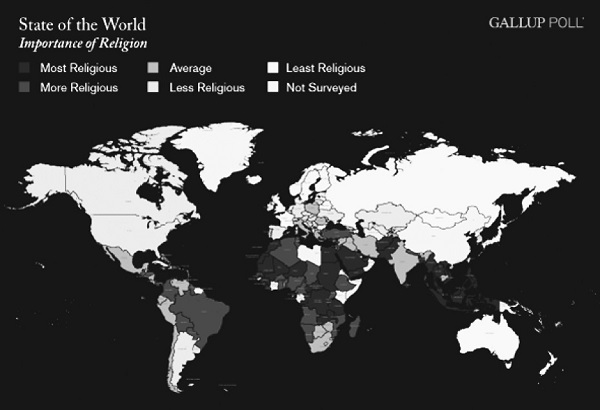
Breaking the See-saw
God offers a cure for every person who realizes that their affluent lifestyle is damaging their spiritual life. It’s a heart attack!
We need to have a heart attack ASAP—not a cardiac arrest but a total spiritual heart transplant. In Ezekiel 36, God tells us that he wants to give us a new heart, a loving heart of flesh to replace our materialistic heart of stone. And God offers it to us for free. He’s offering it right now.
We need to realize that we must let him change us and be ‘born again’ again. We can be an active church member and a financial supporter of God’s work but still contract spiritual heart disease. We need a total heart transplant.
It doesn’t always have to be faith versus finance. It can be, and should be, faith and finance. Or even better, faith regardless of finance. But we live in a fallen world, and we need to understand that when a person prospers, either God gains a partner or the person loses their soul.
Today, the vast majority of us are riding the see-saw. For most of us it really is Faith versus Finance—and the gloves are off!
When the bell rings at the end of the last round, may we each through God’s power, and the decisions we each day, be able to join with the Apostle Paul and say, “I have fought the good fight, I have finished the race, I have kept the faith” (2 Timothy 4:7).
References
1 Credit Suisse, Global Wealth Report, October 2013.
2 Gallup Worldview - Data accessed 14 September 2011.
3 http://www.gallup.com/poll/142727/religiosity-highest-world-poorest-nations.aspx#1


 Julian Archer is the author of HELP! I’ve Been Blessed! How to Stop God’s Blessings from Becoming Curses. He is the founder of the Faith vs Finance movement, which is a global ministry working with materially-blessed Christians who seek a stronger relationship with God and want to know His will for their money, assets, and investments. Learn more at www. Faith-vs-Finance.org. He writes from Toowoomba in Queensland, Australia.
Julian Archer is the author of HELP! I’ve Been Blessed! How to Stop God’s Blessings from Becoming Curses. He is the founder of the Faith vs Finance movement, which is a global ministry working with materially-blessed Christians who seek a stronger relationship with God and want to know His will for their money, assets, and investments. Learn more at www. Faith-vs-Finance.org. He writes from Toowoomba in Queensland, Australia.